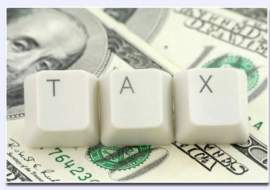
Delaware Tax

FULL List to Delaware Tax Forms
Individual Income Tax
Form 200-01-X Resident Amended Delaware Personal Income Tax Return
Form 200-02-X Non-Resident Amended Delaware Personal Income Tax Return
Corporate Income Tax
Form 1100 Corporation Income Tax Return
Form 1100EZ Corporation Income Tax Return
Form 1100X Amended Delaware Corporation Income Tax Return
Primary Concerns:
In an era where corporate responsibility is at the forefront of most discussions of economic policy, Delaware represented one of the more interesting but least examined areas of interest that probably deserved to be at the forefront of the discussion.
Because Delaware's legislation is so corporate friendly and its taxes on income earned out of state non-existent, it has become the home of most of the corporations in the United States, despite paradoxically being one of the smallest states in the union.
While many would point that this has made Delaware a competitive economy and valuable jurisdiction for many corporations, many have accused of being an illicit tax haven that allows corporations to evade paying tax revenue, something of on an onshore equivalent to the Cayman Islands.
While this seems an extreme classification to some, it remains that many businesses that were involved with the economic meltdown, including Bank of America, are headquartered in Delaware and are thus able to operate while making minimal expenditures to the state government. If you need legal advice and assistance, contact Delaware lawyers.
An argument against this fact is that the state has a relatively high corporate income tax. However, almost 20 states to date have passed laws forbidding companies based in Delaware from taking advantage of income earned in their states being exempted in Delaware.
Many feel that Delaware's corporate friendly tax culture is potentially dangerous, allowing for corporate criminality with minimal oversight. Many in Delaware, who will ultimately decide Delaware's policy, simply feel that the state is being advantageous to corporations. It remains that, to date, Delaware has not appeared on any major "black lists" of organizations that rank illicit tax havens. Some feel though, that it is only a matter of time until they are.
Income Tax:
Delaware income tax is determined on a progressive scale of staggered rates. This means that up until a set income will be taxed at a set rate, while anything above that income will be taxed at the next rate up, but only the surplus income above that rate.
The first $2,000 of any taxpayer’s income is untaxed, while the next $3,000 is taxed at 2.2%. This means that if a total income was $4,000, only $2000 would be taxes, because the first $2,000 is untaxed. The next $5,000 is 3.9% while the next $10,000 is 4.8%. The next $5,000 on top of that is 5.2%, while the subsequent jump is for the next $35,000, which is 5.55%.
These amounts all add up to $60,000, which after the level is a flat 5.95%. So if an individual made $65,000 in income during a taxable year, only the last $5,000 will be taxed at 5.95%, with everything else being rates at their staggered intervals.
Delaware income taxes are not simply for individuals, but also estates and trusts that have taxable income in the state. Residents and nonresidents of Wilmington have to pay an additional 1.25% above the state's existing tax rates, which are derived from totality of income, decoupled from the staggered progression outlined above.
Corporate Income Tax:
Delaware's relatively business friendly environment and corporation laws make it one of the world's largest tax havens. Half of the companies listed on the New York and American Stock Exchange and a majority of Fortune 500 companies are headquartered in Delaware because of this fact.
Surprisingly, Delaware's Corporate Income Tax is a comparatively high 8.7% flat rate, but it has been offset by Delaware's corporate-friendly judiciary and the fact that Delaware does not charge taxes on income earned out of state. The benefit of this is that the corporate tax income from the high volume of corporate entities comprises 20 to 25% of Delaware's tax revenue, meaning that it generally has to pass less of the tax burden on to the average taxpayer.
Delaware does also levy a tax on total business receipt in lieu of a sales tax, which is a flat $75 plus 0.24%. There is also a standard incorporation of $50 for all new businesses, or $100 in the case of a limited liability company (LLC).
Property Tax:
Property tax in Delaware is not mandated on a state level basis, and is instead originated on a county by county basis. Usually this is restricted to real estate only (which is another element that makes Delaware corporate friendly).
Property taxes are determined based on county and city need, and can generally be composed of school taxes, vocational school taxes, municipal taxes and general property taxes. Since Delaware only consists of three counties, New Castle, Sussex, and Kent, the property taxes remain fairly uniform across the state, and in general represent some of the lowest in the entire country.
Sales Tax:
Delaware does not have sales or use tax on the purchase of many of its products, which means that it becomes a popular location for shoppers in neighboring states to commute into for the best deals, and can be beneficial to various retailers who operate in the state. It also has allowed the cost of living in the state to be incredibly low for residents who are unburdened by paying tax on necessities such as food, rent, or purchased property.
Delaware does place a tax on businesses the gross receipts of most businesses; however it is small enough that it is never passed on to the customer. The tax is $75 plus 0.24% of all gross receipts.
NEXT: Florida State Tax





















